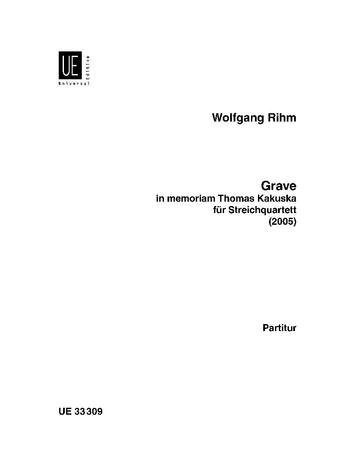.png)
Payments:
Shipping:
Wolfgang Rihm
Rihm: Grave in memoriam Thomas Kakuska for string quartet, for string quartet
UE33309
Type: Partitur
Difficulty: 5 - 7
Format: 232 x 305 mm
ISBN: 9783702430573
Pages: 16
ISMN: 979-0-008-07751-7
Payments:
Shipping:
Description
Wolfgang Rihm first wrote a work for the Alban Berg Quartet as early as 1981, while still an aspiring composer under thirty. His String Quartet No 4 astonished audiences at that time with its wealth of elements firmly grounded in the tradition of the genre, though not for a single bar did it relinquish its claim to a contemporary and individual manner of expression. In these respects the piece proved absolutely pre-ordained for the Alban Berg Quartet, an ensemble which has always stood for exemplary but innovative interpretations of the classical repertoire alongside stalwart support for the new. Now, after 25 years, this same collaboration has been revived, albeit for painful reasons. When the première of the Fourth Quartet took place in Badenweiler, the violist Thomas Kakuska had just joined the ensemble whose style he was play such an essential role in shaping over the coming years. On 4 July 2005, after long illness, Thomas Kakuska died; Rihm’s most recent work for string quartet, Grave, is dedicated to his memory.
In quartet writing the viola normally occupies a position between the two violins and cello. Melodically it often retreats into the background, in order to contribute a constant fundamental colour, a medium value between high and low. Rihm resists the temptation to write a piece which breaks entirely free from this sound world and concentrates only on this instrument; but by means of a few restrained gestures, he nevertheless discovers a way to forge a connection with his dedicatee.
After the piece has begun with repeated allusions to a soft but dissonant chord, a melody develops in the gentle duet of violins accompanied by cello; the viola is silent. Gradually it begins to participate in the proceedings as hidden but perceptible colour. The sound then increases in harshness, until the section erupts into a noise-like sonority. Only then does the viola step into the foreground – first with a gently descending line, then with a whispered motive whose quasi-tonal structure continues to determine the atmosphere of the passage for a while. Generally speaking indeed, hints of major-minor tonality are not uncommon in this work. Ever and again, passing fragments evoke vague reminiscences in the listener’s ear, without ever awakening the impression of a naïve return to the familiar: an approach to dissonance that is typical of the composer, and the subtle placing of counterbalances to tonal formulae, make sure of that. The music moves through various states of feeling, regularly interrupted by noise-like passages played sul ponticello: at its approximate mid-point it even arrives at an almost dance-like passage in which the viola takes the leading role. This is followed by an apparently hymn-like episode, which nevertheless with its pppp marking takes on a character of quiet mourning. The end is announced first by almost violent gestures of piled-up dissonance, which then ebb away in the form of ever more fragmented motives. The final chords form an arch with the beginning, without however – as so often the case elsewhere in Rihm’s work – evoking the impression of a cycle, a possible new beginning: both dynamics and harmony create an unambiguous conclusion.
© Eike Fess, November 2006
The composer on his work:
I received the news of Thomas Kakuska’s death in Metz, where I was working with young performers and composition students. We were all devastated. Günter Pichler of the Alban Berg Quartet called me and asked whether I would like to write a kind of requiem for 'Tommy'. I agreed on the spot and soon afterwards composed this movement for string quartet entitled Grave. The word has overtones of 'Grab' [i.e. 'grave' in the sense of 'tomb'] as well as, naturally, denoting musically a 'weighty' pace of performance.
Perhaps the piece can be heard as a series of moments of repose: momentary blockages to the current of reminiscing thoughts. Movement and rest are the most natural basic forms of musical progression. But flowing right through them is the river to which everything that has extension in time belongs. We pause – listen – move on. This is life.
Wolfgang Rihm
More information
Type: Partitur
Difficulty: 5 - 7
Format: 232 x 305 mm
ISBN: 9783702430573
Pages: 16
ISMN: 979-0-008-07751-7

